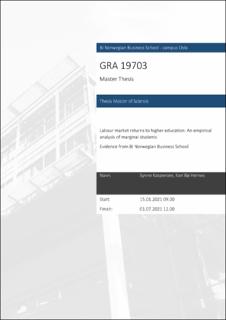| dc.description.abstract | This thesis targets the returns to higher education in Norway, respectively if a
selection of students experienced positive labour market gains from graduating.
The selection refers to bachelor students in business-administrative fields at
BI Norwegian business school, where comparing students from different parts
of the skill-distribution is our main area of study in an attempt to determine
who benefits the most from taking an academic degree. Correspondingly, we
compare marginal students to non-marginal students; using below or above the
threshold of 3.5 in average high school grade points.
To conduct the analysis, we merged internal BI student-registers with data from
Statistics Norway, providing insight into the students’ actual labour market
gains from graduating between the year 2003 and until 2012. We perform a
regression analysis controlling for different variables and their individual effect
on our key dependent labour market variables; Wage and Employement. In
addition, we use an instrumental variable approach to study the effect of the
Progression requirement, a measure introduced in 2006, in an attempt to reduce
the share of bachelor dropouts.
Our main findings point to the fact that completing a bachelor degree at BI has
a positive impact on both wage and employment; graduating before the age of
25 increased wages and degree of employment, at age 25, with respectively 62%
and 13%, compared to the reference group whom never graduates. Further,
when studying the marginal and non-marginal students separately, we found
that both groups indeed experience higher wages from graduating. However,
there is seemingly evidence of a stronger relationship between graduating on
wages for the non-marginal students; graduating before turning 25 led to 68%
higher wages at age 25, compared to 49% for the marginal students. Thus,
our results do point to a case of positive selection. Finally our IV-estimates,
investigating the effect of the Progression requirement, proved that it for a fact
increased student quality by resulting in a 29% higher share of graduates, and
in turn causing a 20% wage growth for the 25 year olds.
Keywords – Educational Economics, labour economics, Marginal students, BI | en_US |
